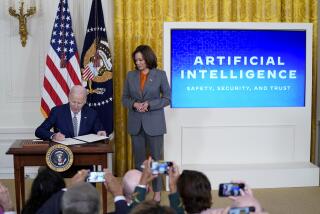Defending patents takes financial toll on inventor
- Share via
Like many other American innovators, Larry Lockwood took the patent system at face value: Invent something new, and you get a limited monopoly to exploit it for up to 20 years. The implicit conditions are that you make your invention public and offer licenses for its use in good faith.
That’s the course Lockwood, now 64, pursued after he received patents in 1994 and 2001 covering e-commerce systems to market merchandise and services.
Programs for translating customers’ search terms into multimedia screenfuls of goods and services for sale may be common today, but the patent office concluded that Lockwood’s combination of searching, retrieving and displaying data — originally aimed at the travel agency and banking businesses — was sufficiently unique and original to warrant protection.
From his La Jolla home he set up a firm to enforce his patent rights. He sued dozens of retailers — including small merchants of chocolates, furniture, plumbing supplies and camping equipment — for alleged infringements, and has also reached licensing deals with big companies such as Walgreen, Kohl’s, and Lowe’s, according to court filings. His patents appeared to be worth $100 million, maybe more.
Then he discovered how easily his rights could be taken away. The process is known as reexamination, and it has developed into a powerful weapon for alleged patent infringers to use against patent owners. Because it’s comparatively cheap, it is shifting the balance of power in patent fights against inventors.
The U.S. patent system is riddled with flaws. The patent office is underfunded, examiners are overworked, and the backlog of unexamined applications is horrific.
Lockwood’s case points to a less obvious flaw: A system that should be based on judicious consideration of technology, science and engineering has become another arena for legal gamesmanship in which money brings all the advantages. This undermines American competitiveness — if U.S. politicians and business leaders are going to grouse about piracy in China and elsewhere, shouldn’t the rights granted by U.S. patents be more secure?
Lockwood says gamesmanship defines his case. He points the finger at the big Century City law firm Sheppard Mullin Richter & Hampton, which eventually represented a stable of alleged infringers of Lockwood’s patents. He blames the firm and an associate for planting stories in the business press portraying him as a blackmailer targeting the little guy. A website entitled “youmaybenext” solicited clients and contributions for an anti-Lockwood campaign. “They made me look like a monster,” he says.
In 2003, Sheppard Mullin filed a reexamination petition for Lockwood’s patents with the U.S. Patent Office. As is customary, Lockwood’s pending infringement lawsuit was put on hold and potential licensees refused to make deals until the reexaminations were completed.
That took four years, cost Lockwood huge legal fees — and resulted in his patents being upheld. “This is the tragedy,” he told me recently. “Your patent can be stolen from you in the dead of night and you have to spend hundreds of thousands of dollars to get it back.”
What’s worse, he says, is that Sheppard Mullin tricked the patent office into accepting the reexamination request by engaging in fraud.
Before we get into that, let’s examine the reexamination process. There’s nothing inherently wrong with providing for the reexamination of issued patents. Patent examiners aren’t exempt from making mistakes, especially with novel technologies. Properly applied, reexaminations help examiners refocus on things they may have missed in the original applications.
But accused infringers know that time is on their side because a patent is a wasting asset. Although reexamination can chew up a big chunk of a patent’s 20-year term, there’s no provision in the law for recovering the lost time, even when the process results in a reaffirmation, as it did in Lockwood’s case.
Moreover, the rapid march of technology can sap a patent’s value long before the 20 years are up. Inventors often have to move fast to extract any value from their government-granted monopolies. The nearly three years lost to the average reexamination can mark the difference between a patent system that creates a genuine incentive for innovation and one that generates worthless scraps of official paper.
The chief imbalance is that the costs of reexamination all weigh on the patent holder’s side. Requesting a reexamination is dirt cheap; fighting it can cost hundreds of thousands of dollars, not including the value of the time lost before expiration. Online legal forums bristle with advice for accused patent infringers about how to use the process — as Irell & Manella partner Greg Gardella wrote in a recent California law newsletter, fighting an infringement lawsuit in court can cost $2.5 million to $5.5 million. Filing a reexamination request can cost as little as $10,000.
It shouldn’t surprise anyone that the volume of reexamination requests has exploded. The patent office fielded 297 requests in 2001; last year the figure was 1,061.
What scares experts in patent law and legal ethics is what happened to Lockwood after he prevailed in his reexaminations. Lockwood sued Sheppard Mullin, contending that the firm knew all along that its grounds for seeking the patent reexaminations were bogus — that it knew the patent agency waves through more than 90% of the petitions without checking too closely if they have solid grounds, and then takes its time doing the actual reexaminations.
Lockwood estimates that he lost profits of $32 million from forgone deals while in reexamination limbo. He hoped that if he could prove the firm lied in its reexamination petition to give its clients an advantage in litigation, he could collect damages for its misdeeds.
In answering Lockwood’s lawsuit, Sheppard Mullin called his allegations “recklessly false.” The firm maintains that its “conduct in seeking reexamination of the patents in question was altogether proper,” according to a statement its general counsel, D. Ronald Ryland, sent me.
But the substance of Lockwood’s allegations has never been tested in court. State and federal judges have ruled, based in part on a 2001 Supreme Court decision, that because the U.S. patent office has the power to discipline lawyers who practice before it, its authority preempts any other court action.
The patent office’s disciplinary power, however, is modest. The agency can bar lawyers who commit fraud in patent filings from bringing patent cases in the future — but reexamination requests can be filed by anyone, even anonymously, in which case the patent office has no disciplinary cudgel. There’s no provision for victimized inventors to recover damages. And the lower-court rulings leave them with nowhere else to go.
Legal experts who have rallied to Lockwood’s cause say the rulings remove the threat of damage judgments that help keep lawyers on the straight and narrow — let one file a fraudulent lien to block a real estate deal, and the property owner can sue him or her to recover losses. Not in patent cases. And the rulings might open the door to unscrupulous lawyering before hundreds of federal agencies if the preemption rule is interpreted broadly.
“I’m not sure our system can function if fraud can derail your property rights,” says David Hricik, a legal ethics expert who has filed a friend of the court brief supporting Lockwood’s appeal to the U.S. Supreme Court. “It can’t be right for state law to not allow you to sue somebody who deliberately hurt your property.”
It’s a long shot that the court will even accept Lockwood’s case. Congress isn’t likely to be much help; although it’s currently considering a patent reform bill, addressing the issues raised by Lockwood’s travails isn’t on the agenda. In any event, Congress has been working on reform for the last six years.
The system is “made to order to do what’s happened to me,” Lockwood says. “My case has blessed all the schemers who are thinking about the best way to stop an infringement trial.”
Michael Hiltzik’s column appears Sundays and Wednesdays. Reach him at [email protected], read past columns at latimes.com/hiltzik, check out facebook.com/hiltzik and follow @latimeshiltzik on Twitter.
More to Read
Inside the business of entertainment
The Wide Shot brings you news, analysis and insights on everything from streaming wars to production — and what it all means for the future.
You may occasionally receive promotional content from the Los Angeles Times.











